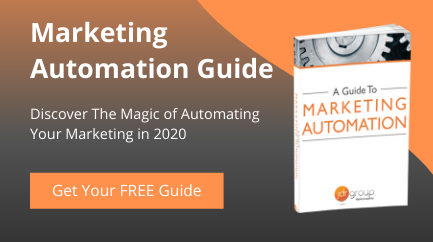What is Marketing Automation Strategy?

At JDR we hear the question a lot “What is marketing automation and what can it do for my business?”
Our partners Hubspot sum this question up incredibly well:
“At its best, marketing automation is software and tactics that allow companies to buy and sell like Amazon – that is, to nurture prospects with highly personalized, useful content that helps convert prospects to customers and turn customers into delighted customers. This type of marketing automation typically generates significant new revenue for companies, and provides an excellent return on the investment required."
Still confused about marketing automation and what it means for your business? Let’s look at it in closer detail.
What is marketing automation?
We have been using marketing automation in our business for longer than we think. Businesses have been using software to automatically insert names and addresses from a database onto letters to send customers for a long time.
Now we have vast amounts of information and technology available to us that when someone visits a website you have the ability to nurture them from a lead into a valued customer by utilising marketing automation.
Amazon is one of the best examples of marketing automation in full flow, and I’m sure most of us are familiar with the Amazon website.
When you visit the Amazon website and you enter your username and password you will find that your name has been added to the website. Not only has personalisation occurred on the Amazon website but you will notice that Amazon now shows your browsing history, past purchases and ‘wish list’. Amazon then do something very clever indeed by also showing you brand new products available on the website and products that you may like to buy, all from your account history.
After leaving the site, we are then sent emails highlighting products that we have viewed or shown an interest in. Emails are also sent from Amazon that highlight new and exciting products that we might want to purchase, all from our viewing history and items previously purchased. This is marketing automation working at full capacity and making sure that we purchase as much as possible from Amazon and return to them as the market leader.
Benefits of marketing automation
- Personalisation – automation helps customise the experience to the user, creating a tailored and more appealing experience that’s relevant and will stimulate the lead/consumer to make a buying decision with your business.
- Workflows – multiple workflows can be scheduled way ahead of time and released only when leads/consumers trigger the workflow. Workflows are triggered by when a lead fills in a form on a landing page, clicks on a CTA (call to action) or downloads an E-book from your website. The workflow then nurtures a lead through the buying journey to ultimately turn that lead into a valued customer.
- Efficiency – it provides a streamlined instant response to a lead when they interact with your business. This enables your business to be responding to potential customers instantly and provide them with targeted and personalised marketing to meet their needs.
- More Information for the sales team – it can help to make sure that leads don’t disappear off the radar. Marketing automation shows your sales team at what stage the lead/consumer is in, in the automation process, and when to act to make the sale.
- Data collection – automatic marketing offers a touch-point to clients or customers that isn’t necessarily sales focused. It can help provide better insight for the customer and be used to collect specific data to evolve and improve marketing automation.
- Consistency – Incorporating all your marketing efforts in the automation process can help keep a unified brand that is seen by leads and all your customers. This gives customers a sense of trust and shows your business as the market leader.
Marketing Automation Strategy
In the world of digital marketing, efficiency and automation are key. Businesses are constantly seeking ways to streamline their operations and make the most of their marketing efforts. One way to achieve this is through a Marketing Automation Strategy, which involves the use of advanced tools and strategies that automate repetitive tasks, freeing up valuable time for more strategic activities.
This Marketing Automation Strategy involves the use of software to automate tasks such as email marketing, social media posting, and lead nurturing. This not only ensures consistent communication with customers but also allows businesses to personalize their interactions based on customer behavior and preferences. The result is a more engaged customer base and a higher return on investment for marketing efforts.
However, it’s not just about automating tasks. A successful Marketing Automation Strategy is about strategically leveraging these tools to nurture leads with personalised content, converting prospects into customers, and turning customers into brand advocates. By doing so, businesses can focus on growing and nurturing their customer relationships, leading to increased customer loyalty and ultimately, business growth. This strategic approach to automation is what sets successful businesses apart in the digital marketing landscape.
How We Can Help
In the digital age, nurturing relationships is key to effective marketing. Traditional techniques often fall short, and that’s where a Marketing Automation Strategy can help. The JDR Group offers a strategy that automates marketing tasks, allowing you to focus on crucial stages of the buyer journey.
Our approach ensures consistent contact with customers, fostering relationships that encourage repeat business. With the JDR Group, you’re not just adopting a strategy; you’re embracing a solution for growth and success.
Interested in transforming your business with a tailored Marketing Automation Strategy? Contact us today. We’re here to help your business succeed.
Image Source: Canva



